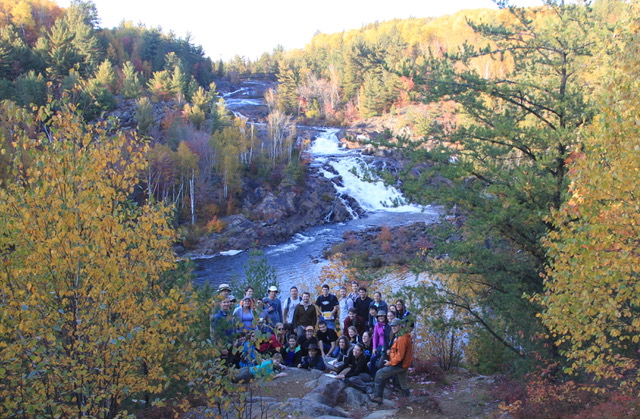Join us for our annual impact crater short course held each Fall. This is a 7-day intensive field school that will take place in and around Sudbury, Ontario.
Impact Cratering Short Course and Field School

Members of the 2012 Field School at Onaping Falls.
This course is offered in collaboration with the Canadian Lunar Research Network and the Solar System Exploration Research Virtual Institute.
Dates: November 1st – 8th, 2025
Location: Sudbury, Ontario
Contact: Dr. Gordon Osinski (gosinski@uwo.ca)
Prerequisites/Antirequisite: In order to participate in this field school knowledge of basic rock types and geological processes are necessary. An undergraduate degree in an Earth Sciences-related field and/or graduate-level courses such as PLANETSC 9603 (Planetary Science Short Course) and/or GEOL 9635 (Planetary Surface Processes), or similar, will provide the necessary background. Contact the course instructor for questions about the suitability of a course.
Cost
- Western Graduate Student: $1000
- Graduate Student at another Ontario University: $1,250
- Graduate Student at a non-Ontario University: $1,500
The price includes transportation from London, Ontario, to Sudbury, field transportation, accommodation, course material costs, and breakfast and lunch from November 2nd to 8th.
Registration – Western Students
There are only limited spaces available on this course. Priority will be given to students enrolled in the Collaborative Graduate Program in Planetary Science and Exploration.
Registration – Non-Western Students
Acceptance to this short course for non-Western applicants will be based on competition. Successful applicants will be contacted directly and provided the link for payment of course fees. To apply, please email cpsx@uwo.ca with the following:
- Name
- Address
- Phone number
- University
- Nationality
- Program Level ( i.e 3rd year of PhD)
- A 300 word description of (a) interest and any previous experience in impact cratering processes, (b) thesis topic (if determined), and (c) how you think this course will enhance your educational goals
- CV (PDF format)
- Unofficial transcript (PDF Format)
- 1 letter of recommendation from a faculty member who confirms your enrollment in a Masters or PhD. program.
Logistics
Travel details will be shared with participants once confirmed. Accommodation will be in shared hotel rooms. Pick-ups and drop offs at Toronto Pearson International Airport may be possible depending in timing.
Course Objectives
The principle objective of this course is to introduce students and researchers to impact cratering as a fundamental geological process on Earth and throughout the Solar System.
Course Description
Impact cratering is one of the most fundamental, yet poorly understood, geological processes in the Solar System. On many planets, impact craters are the dominant geological landform. On Earth, erosion, plate tectonics and volcanic resurfacing continually destroy the impact cratering record, but even here, the geological, biological, and environmental effects of impact cratering are apparent. Impact events are destructive and have been linked to at least one of the “big five” mass extinctions over the past 540 Ma. In recent years, it has also become apparent that impact craters can also have beneficial effects: many impact craters are associated with economic metalliferous ore deposits and hydrocarbon reservoirs. Impact events can also create new biological niches, which can provide favourable conditions for the survival and evolution of life and potentially on other planets such as Mars.
Course Evaluation
The one-week course (PLANETSC 9604) is a 0.5 FCW credit. Students registered in the course will be evaluated as follows:
Course Participation = 15%
Sudbury Field Research Project = 35%
Research Paper = 50%
Class Participation
Attendance is required at all classes, unless special extenuating circumstances apply. Each student is expected to actively contribute to all class discussions. Students are encouraged to read widely beyond the readings specifically assigned for class and bring own readings and experiences into the class discussions. It is expected that each student will come prepared to debate, defend and critique the readings and the presentations.
Sudbury Field Research Project
A research project will be carried out in the field at the Sudbury Impact Structure. Further details will be announced during the course.
Research Paper
Each student will prepare a research paper. Students will have the choice or writing a review-type paper on a particular subject, or a research-based paper in the form of an extended conference abstract, which will be based on results and data gathered by the student during a small research project that will last for the duration of the semester following the short course. For both papers, students are encouraged to consult the professor regarding the choice of the topic.
These papers will be due at 11:59PM on Monday, December 15th, 2025.
Review papers should not exceed 20 pages (double spaced) and must include at title page, an abstract (maximum 200 words), figures and tables (where appropriate) and a reference list.
The research-based paper will involve students taking on a small research project on a particular topic. Students will have the opportunity to investigate various sites of uncharacterized samples from several terrestrial impact structures. Students will have access to polished thin sections and hand specimens and basic optical microscopy facilities. Students are welcome to propose collecting geological data on their samples; however, this will depend on the availability of funds and instrumentation at the time of proposing and must be discussed with the professor in advance. Other types of research projects – for example, application of computer modeling to cratering studies, or remote sensing studies of impact craters on Earth or another planetary body – are also permitted and are welcome. Students will prepare an LPSC-type extended abstract using a standard template available from the Lunar and Planetary Institute. Supplementary figures and text (not exceeding 5 pages) must be supplied detailing methodology, etc. All “raw” data collected (e.g., sample descriptions, analyses, etc.) must be submitted in an easily readable and traceable form (e.g., an MS Excel spreadsheet for detailed sample descriptions and analyses).